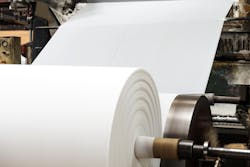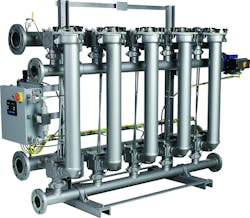One filter for filtration: Reducing water consumption at a paper manufacturing facility
Water is not only essential for human life but also indispensable in scores of industrial production processes. Companies are looking for ways to clean and recycle used water to reduce consumption as much as possible and ensure that water is used responsibly. Producing filter sheets is a water-intensive process. Eaton has developed its own automatic tubular backwashing filter that significantly reduces the consumption of fresh water during paper manufacture.
Background: Filter sheets for life science applications
The United Nations' 17 global sustainable development goals state that making clean water readily available to all people is one of humankind's most crucial goals. Businesses are playing a pivotal role in this effort, as demonstrated by energy management specialist Eaton. Eaton has reduced its water consumption worldwide by 87 million gallons since 2015. The company sees reducing water consumption as essential, both now and in the future.
The importance of reducing consumption is particularly relevant in areas where a comparatively large amount of water is required, such as at Eaton’s Langenlonsheim facility in Germany. Eaton manufactures a range of products in Langenlonsheim, including filter sheets for use in the food and beverage markets and in the pharmaceutical industry. Filter sheets measuring 0.08 to 0.2 inches thick may be significantly bulkier than paper, but they are produced in a similar way.
The first step in manufacturing filter sheets is to create a specific fiber suspension during pulp preparation. This suspension has a maximum water content of 99% and passes through a Fourdrinier wire, where gravimetric forces and a pump-generated vacuum drain the water. After undergoing various process steps, the final product has a water content of less than 1%.
The challenge: Process water containing particles need to be filtered
Both the manufacture of the fiber suspension and the continuous conditioning of the Fourdrinier wire require huge amounts of fresh water. It was up to the production managers at Eaton to help the company achieve its global sustainability goals, so they began looking for ways to filter and save process water.
If treated water is of a sufficiently high quality, it can be used again in other production processes. This reduces the consumption of freshwater, bringing costs down and lessening the environmental impact. The aim was therefore to separate the particles from the excess process water and reuse the filtered water in cleaning processes.
The solution: Low maintenance tubular backwashing filter
The filtration experts finally found what they were looking for close to home: In the F-Series, Eaton offers a powerful automatic tubular backwashing filter that is well-established in the paper industry.
"We supply to both international paper machine manufacturers and special applications in paper mills," said Ulrich Latz, technical sales engineer in Eaton’s Filtration Division. "Our filters have been used in this field for decades and undergo continuous development."
For the paper industry, the low-maintenance filter systems provide a valuable service by reducing the particle concentration in the process water. In Langenlonsheim, the excess water from the Fourdrinier section is filtered via the F-Series tubular backwashing filter. The filtered water can then be reused for cleaning or in other processing areas.
The F-Series is a modular filter system that can be adapted to process-related changes using extensions. The system can be designed to accommodate 2 to 20 filter stations and consequently adapted for different volume flows, enabling it to clean up to 3,000 gallons of water per minute. The automated system does not require any operating personnel and uses differential pressure measurement to detect when the filter elements need cleaning. This process is based on the tubular backwashing principle: One station after the other is backwashed with a high volumetric flow.
"The incoming water flows into the filter via the lower header and is distributed to the individual filter stations," said Latz.
"This process only takes five to 10 seconds per station," said Latz. "Meanwhile, filtered water continues to flow out without interruption and filtration is continuous."
Backwashing using external flushing water with a low solids content is also possible when the flow or pressure of the water to be filtered is too low for backwashing or to prevent pressure surges in the system. In this case, a fourth header is employed. This header is supplied with an external flushing medium and delivers it to the station to be backwashed via automatic ball valves. Since the entire flushing process takes only a few seconds for all stations, only a small amount of water is used.
"The use of the F-Series in the production of filter sheets at the Langenlonsheim site was not self-evident at first," Latz said.
In the conventional paper industry, the process water needs cleaning of solids ranging from 150 to 230 microns in size. However, in the manufacture of the special filters at Langenlonsheim, much smaller particles measuring as little as 25 micrometers need to be separated.
"The fact that the filter sheets are manufactured with relatively low flow rates is a benefit and that the particles differ significantly in size from those in paper manufacture," said Latz.
Changing the slotted wedge wire element to a mesh size of 25 micrometers produced the desired result.
The result: High savings with even greater potential
It was easy to adapt the automatic tubular backwashing filter to the production specifications of the filter sheets. Since operating the backwashing filter in this manner, the filtered water has been used in the production process for cleaning purposes.
"With just four filter stations, in total we've saved well over 2.6 million gallons of water a year since the F-Series was installed," said Eaton's head of production in Langenlonsheim.
He views the low-maintenance operation of the automatic tubular backwashing filter during long production phases as especially important.
"Filtration of the water works exactly how we intended," he added. "This has allowed us to further optimize our production environment using our own internally developed technology."
This success does not mean that no further measures will be taken to reduce water consumption. The system will be expanded next year with the aim of saving up to five times more over the current volume. This will make it possible to use even more filtered process water for cleaning purposes and, in the future, in other process areas too. This is another step toward creating a sustainable production process and making responsible use of natural resources.
Ulrich Latz is a technical sales engineer at Eaton and located in Nettersheim, Germany. He specializes in self-cleaning filter systems and has more than 10 years of experience in diverse industrial filtration applications.

